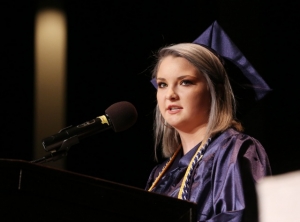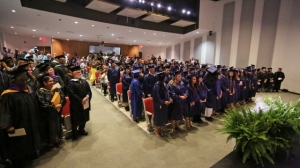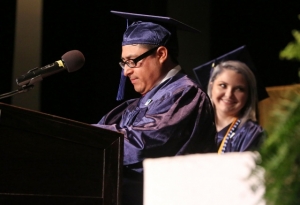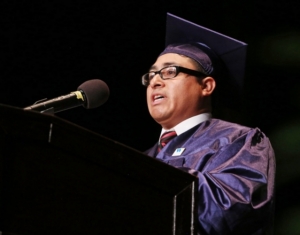WCC adult high school graduation
By Phyllis Moore
Published in News on May 14, 2018 9:16 AM

News-Argus/CASEY MOZINGO
Lauren Smith speaks to the Spring graduates of the Wayne Community College High School Equivalency and Adult High School Graduates in Moffatt Auditorium Friday. Smith is an Adult High School graduate.

News-Argus/CASEY MOZINGO
Spring graduates of the Wayne Community College High School Equivalency and Adult High School Graduate programs enter Moffatt Auditorium Friday as they wait to receive their diplomas.

News-Argus/CASEY MOZINGO
Miguelina Velazquez prepares to make a speech to the Spring graduates of the Wayne Community College High School Equivalency and Adult High School Graduates in Moffatt Auditorium Friday. Velazquez is a High School Equivalency graduate.

News-Argus/CASEY MOZINGO
Miguelino Velasquez speaks to the spring graduates of Wayne Community College High School Equivalency and the Adult High School graduates in Moffatt Auditorium Friday.
Thirty-three Adult High School students and 149 High School Equivalency degrees were presented Friday morning at Wayne Community College, as part of the transitional programs for college and career.
Two graduates, representing each of the aforementioned programs, were chosen to address their classmates, both called remarkable by WCC president Dr. Thomas Walker Jr.
"Like each of you, (they) have a story to share of their trials, but mostly importantly their successes," he said.
Miguelino Velasquez earned his high school equivalency diploma through HEP, or high school equivalency program, a grant-funded initiative of the U.S. Department of Education that provides migrant and seasonal farm workers and immediate family with the training necessary to obtain the diploma.
In 2012, WCC partnered with Wake Technical Community College to bring HEP to Wayne County, Walker said. As a result, 175 students have since completed the program, 25 of those this year.
"Miguelino had been unable to earn a high school diploma in his country," Walker explained. "When his family moved to the U.S., he wanted to finish his education and one day become a nutritionist. However, his family's needs came first so instead, he had to get a job.
"(He) spent the next 15 years working at a plumbing company, with no hopes to realize his professional career."
Then he learned of the HEP program, which changed the trajectory of his life, Walker said in his introductory remarks.
The experience only served to make Velasquez realize the importance of an education and all the doors that would be opened to him if he took that step, he said.
"I dreamed of better opportunities, better pay and maybe even a professional career," he said.
There are many, just like him, he said, whose parents work long hours and are forced to leave their children in the care of others. Those parents, like Velasquez, aspire to create a better life for themselves, as well as their family, he said.
Having the high school diploma is a great "next step" toward accomplishing that, he said, sharing his game plan for the future.
"I plan to enroll in ESL (English as a second language) classes so I can improve my English, and then I will research my academic options in allied health so I can very slowly get closer to my goal," he said. "One day I hope to become a nutritionist and have my own practice."
Lauren Smith, a student in the Adult High School program, enrolled in the alternative offering after a medical diagnosis interrupted her plans and changed the course of her life.
"Have you ever felt like you were stuck in a place of darkness and felt that you would never see the light? And have you ever felt so alone that you felt as if you were invisible?" she asked.
An avid soccer player since age 4, she had been an all-star player in middle and high school, as well as on a competitive traveling team.
That changed after her first concussion in 2016, her freshman year of high school.
"Less than two months later, I was walking out of the gym during P.E. and immediately dropped to my knees when I saw the sunlight," she said. "Days later, I was sitting in a neurologist's office in Greenville. I received a series of MRIs and CT scans assessing the damage to my brain.
"The doctor believed that I had other, unconfirmed concussions in the past."
She also received some devastating news, she said, that soccer, "a huge part of my identity" may have to be discontinued due to the effects of traumatic brain injuries.
Around that time, her parents also separated and Smith fell into a depression, making attending classes difficult.
All of this led to her enrollment at WCC, when her mother learned about the AHS program. She recalled the day she came out for an interview.
"When I left, I felt like this was just the place for me," she said. "This was the first glimpse of hope that I had felt in a long time. This is when things started to fall into place.
"The classes were small which helped with my anxiety and I began to get good grades. There was a lot of one-on-one attention, and the teachers truly care about your success, not just academically but also personally."
Graduating on Friday was a special occasion, she said, but her journey is not ending there.
She has plans to continue her education at WCC for two years, completing the requirements needed to transfer to East Carolina University, and pursue a major in sports physical therapy.
